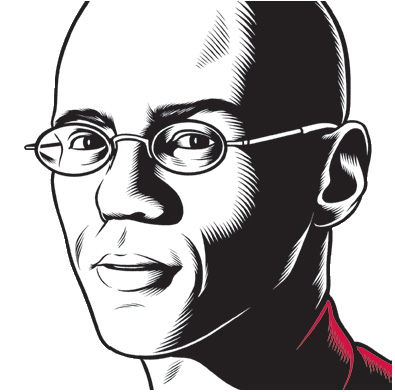Victor LaValle’s debut book of short stories, Slapboxing with Jesus, won the PEN Open Book Award. His first novel, The Ecstatic, was a finalist for the PEN/Faulkner Award. His writing draws comparisons to Gabriel García Márquez and William Faulkner. Mos Def named his 2009 album after LaValle’s novel. In addition to this honor, LaValle has been awarded a Whiting Writers’ Award, a Guggenheim fellowship, and the key to Southeast Queens. His latest novel, Big Machine, was named one of the ten best books of the year by Publishers Weekly. It was also awarded the 2010 Ernest J. Gaines Award for Literary Excellence. LaValle was recently a writer in residence at the Dutch Foundation for Literature in Amsterdam, working on a film adaptation of Big Machine in cooperation with Amsterdam’s Binger Filmlab.
Big Machine details the complicated history of the Washburn Library, a research institute based in Vermont that takes in former addicts and ex-criminals, all black, and trains them to investigate supernatural occurrences. The book’s main character, Ricky Rice, a recovering junkie and former childhood member of a dangerous Afrocentric religious cult, is pulled into solving the mystery of the Washburn Library’s purpose and its early history as the legacy of Judah Washburn.
LaValle’s novels complicate traditional narratives of American history and African American history in unexpected and imaginative ways. His work focuses on characters who are outside the mainstream, the type of people less-imaginative observers might deem “outcasts.”
—Kaitlyn Greenidge
I. “I MADE MORE OF AN EFFORT TO BE A STORYTELLER…. WHICH IS DIFFERENT FROM BEING A WRITER.”
THE BELIEVER: How old were you when you first started writing?
VICTOR LAVALLE: Ten or eleven. Twelve years old. I would copy Stephen King and H. P. Lovecraft stories. What I mean is, I would read a story by one of them and try to write exactly the same story. But I don’t know anything about small-town life in Maine, King’s specialty. And I don’t know what it’s like to be a misanthrope in Rhode Island, which was Lovecraft’s. So my stories were always sort of vague and fake. But I kept trying.
BLVR: When did you feel you could call yourself a writer?
VL: I never had any qualms about saying I was a writer. I didn’t come from the kind of people who talked about writers as some rare and cherished beings. This is because we didn’t actually talk about “writers” at all. There were a few books in the home: the Bible and the Encyclopedia Britannica, that kind of thing. My uncle was always a voracious reader, and sometimes he’d leave books at our apartment when...
You have reached your article limit
Sign up for a digital subscription and continue reading all new issues, plus our entire archives, for just $1.50/month.
Already a subscriber? Sign in





